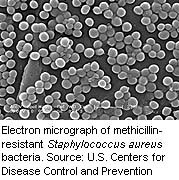- Recognizing the Signs of Hypothyroidism
- 10 Strategies to Overcome Insomnia
- Could Artificial Sweeteners Be Aging the Brain Faster?
- Techniques for Soothing Your Nervous System
- Does the Water in Your House Smell Funny? Here’s Why
- Can a Daily Dose of Apple Cider Vinegar Actually Aid Weight Loss?
- 6 Health Beverages That Can Actually Spike Your Blood Sugar
- Treatment Options for Social Anxiety Disorder
- Understanding the Connection Between Anxiety and Depression
- How Daily Prunes Can Influence Cholesterol and Inflammation
VA Program Reduces MRSA Germ Cases at Long-Term Care Centers


The number of infections with dangerous antibiotic-resistant bacteria at VA long-term care centers has dropped since a program to combat the problem was launched in 2009, a new report shows.
The initiative to reduce the number of methicillin-resistant Staphylococcus aureus (MRSA) infections was implemented in 133 VA long-term care facilities. Within 42 months, there was a 36 percent decrease in MRSA infections at those centers.
This is the first time that such a large decline in MRSA infections in long-term care facilities has been reported, according to the authors of the study published in the January issue of the American Journal of Infection Control.
Patients in long-term care centers are at risk for infection with bacteria that are resistant to numerous types of antibiotics, and these bacteria can be difficult to control in such facilities. In a medical facility, MRSA can cause life-threatening bloodstream infections, pneumonia and surgical site infections, the study authors noted in a journal news release.
The program used in the VA centers had already proven effective in reducing MRSA infections in hospitals. It includes screening all patients for MRSA, use of gowns and gloves when caring for patients colonized or infected with MRSA, good hand hygiene, and emphasizing caregivers’ individual responsibility for infection control.
The findings suggest that following “a simple bundle of infection prevention and control strategies” may be an effective way to control MRSA infections in long-term care centers, especially if such measures are implemented in a large number of facilities, Dr. Martin Evans, of the VA Medical Center in Lexington, Ky., and colleagues concluded.
More information
The U.S. National Institute of Allergy and Infectious Diseases has more about MRSA.
Source: HealthDay
Copyright © 2026 HealthDay. All rights reserved.










